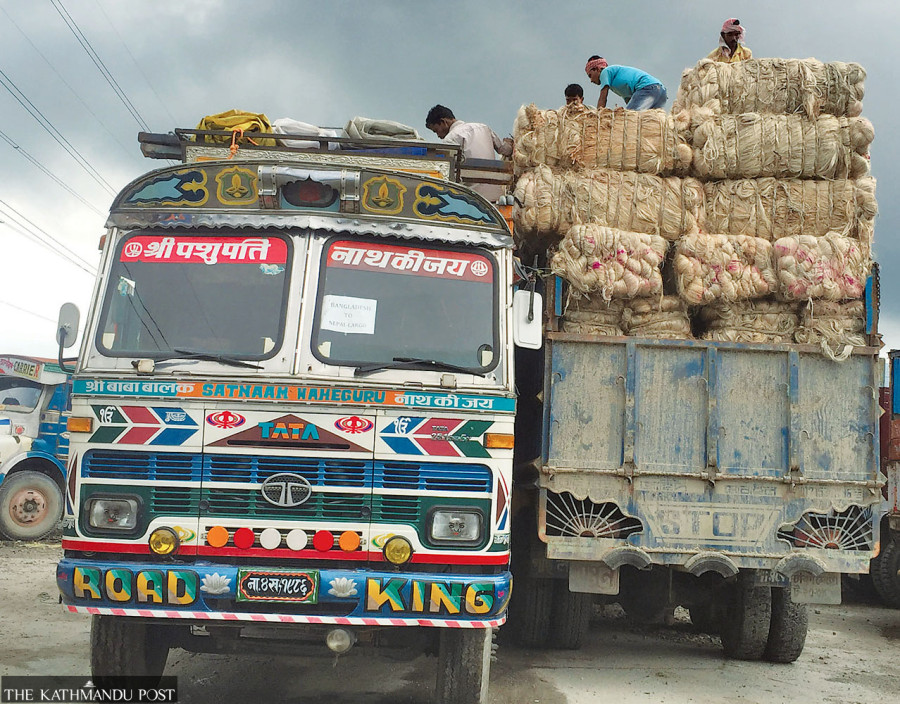Money
BBIN motor vehicles pact has a bumpy ride ahead for lack of policies, regulations
An early implementation of the motor vehicles agreement between Bangladesh, Bhutan, India and Nepal can shorten transport routes, save travel time, and lower costs.
Krishana Prasain
Nepal has a long way to go when it comes to implementing the Bangladesh, Bhutan, India and Nepal (BBIN) motor vehicles agreement, which was signed seven years ago but has been a nonstarter, a new study shows.
According to the study entitled ‘Enabling Political and Economic Discourse for Multi-Model Connectivity in the BBIN Sub-region’ unveiled by Nepal Economic Forum on Tuesday, Nepal lacks adequate policies and regulations to implement multimode connectivity in an effective manner.
“Policies such as the Multimodal Transport of Goods Act, 2006 have not been reviewed to include changes in the trade environment,” says the report.
The BBIN motor vehicles agreement, facilitated by the Asian Development Bank, was signed in June 2015.
Its objective is to enable seamless movement of passenger and cargo vehicles across borders among the neighbours. The agreement also aimed at bringing four countries closer to aid trade and economic integration.
The four countries had also agreed on a six-month work plan from July to December 2015 to implement it. But so far progress has been sluggish.
An early implementation of the BBIN motor vehicles agreement can shorten the transport routes, save travel time, and lower costs, in addition to reducing the carbon footprint, according to the World Bank. Its analysis finds that under the agreement, a truck travelling from Agartala in India’s northeast to Kolkata port will take 65 percent less time and the cost will be 68 percent cheaper.
According to a World Bank report, although trade between the BBIN countries grew six-fold between 2005 and 2019, the unexploited potential remains massive, estimated at 93 percent for Bangladesh, 50 percent for India and 76 percent for Nepal.
Nepal has yet to develop technical guidelines or standards for inland navigation, the report said.
The insufficiency of Nepal's infrastructure and facilities in the gateway ports of India and Bangladesh is one of the challenges it faces in connecting with the global market.
In terms of logistics and transport infrastructure, Nepal still requires adequate cold storage, warehousing, freight stations, laboratory and parking facilities.
There is a need for single-window compliance with supporting infrastructure like computers, stable internet, uninterrupted electricity and developing and upgrading of road infrastructure, according to Nepal Economic Forum report.
Transit cargo clearance is mostly handled manually, which affects transaction costs and affects cross border movements between India and Nepal.
Presently, member countries are negotiating the protocols [one for passengers and other for cargo vehicles] to implement the motor vehicles agreement.
“There is a need to make several interventions on the issues like transit, visa and currency issues,” said Raju Tuladhar, project coordinator for Nepal Economic Forum. “There was on the protocol that transit fees will be charged which is not practical for landlocked countries like Nepal and Bhutan and as also as per the international trade agreement.”
There is an issue with visas as Nepal and Bangladesh do not provide an on-arrival visa to each other, according to Tuladhar. And, there’s also a problem with currencies between the two nations.
“There is a trust issue among the four countries while Nepal lacks negotiating capacity with India,” said Tuladhar.
The report says enabling a political economy discourse is critical to facilitate multi-modal transport connectivity in BBIN sub-regions.
“The political economy discourse will require a clear understanding of ground-level challenges at the national and sub-regional level,” the report adds.
According to the report, with the implementation of the BBIN motor vehicles agreement, Indian trucks workers fear loss of jobs, particularly in loading and unloading.
While Indian trucks are freely allowed to Nepal, Nepali trucks have to pass through a lengthy procedures to enter India, according to the report.
Poor condition of roads is a serious impediment to cross-border trade, according to a report “Connecting Corridors beyond Borders-Enabling seamless connectivity in BBIN Sub-region” published in 2018 by CUTS International.
For instance, the current state of hard infrastructure at Raxaul-Birgunj land customs stations is also poor. The two-lane bridge over the Sirsiya river near the border is narrow.
The condition of the road from Mothihari to Rauxal does not allow efficient movement of trucks. The corridor for transit across India for trade between Nepal and Bangladesh through Banglabandha-Fulbari-Kakarvitta also faces similar road infrastructure issues.
The road infrastructure from Nepal to Mugling is in significant need of investment and improvement and poses a challenge to trucks, particularly during the monsoon season.
In March 2022, member countries finalized the enabling memorandum of understanding for the implementation of BBIN motor vehicles agreement among three countries. A sub-committee has been formed to discuss the modality of the protocols.
The March meeting also agreed to operate the transport routes in Kakarvitta-Kolkata-Dhaka or Biratnagar-Kolkata or both in the next six months.




 14.12°C Kathmandu
14.12°C Kathmandu













